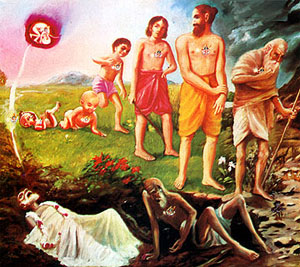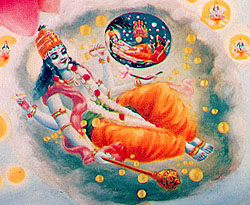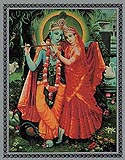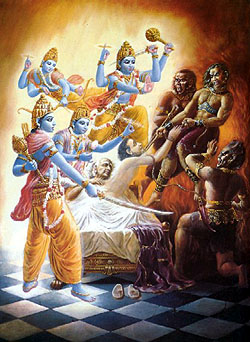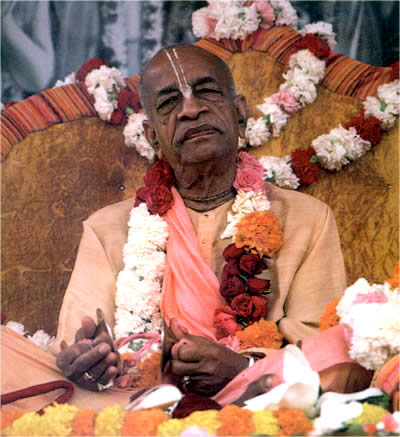
[The Story of the Boatman & The Technology Student]
In India, especially in Bengal, there are many rivers. The land is full of rivers. Because it is on the bank of the Bay of Bengal, all rivers are falling. Therefore Bengal, the land of, especially the east Bengal, is full of rivers. One student of technology was going home, and he was on the boat. So the student was asking the boatman, "Do you know what are the stars?" The boatman said, "Sir, we are ordinary boatman. What do we know about these stars?" "Oh. Then your fifty percent of life is wasted, useless." Then he was asking, "Do you know what are these trees? Do you know any science of botany?" He said, "Sir, we are ordinary laborer. What do we know about botany?" "Oh. Then seventy-five percent of your life is useless." In this way the student of technology was asking the boatman, "Do you know this? Do you know that?" And he said that "I am ordinary man. What do I know all these things?" Then all of a sudden there was a black cloud, and there was storm, and the river began to be inflated, and the boatman said, "My dear sir, do you know swimming?" "Oh," he said, "no." Then he said, "Then your cent percent knowledge is spoiled. Now you have to go down to the river. Your life is finished." In this way they dropped in the river, and the technological student, because he did not know how to swim, so the storm and the waves grabbed him.
The idea is that we are making progress, certainly, in technology, in economics, in so many other departments of human necessities. But Bhagavad-gita says that real problem of this world, or real problem of our life, it is said in the Bhagavad-gita, janma-mrtyu-jara-vyadhi-duhkha-dosanudarsan am. If you are intelligent enough, then you should see the real problem is birth, death, old age and disease. Janma means birth, and mrtyu means death. Janma-mrtyu-jara. Jara means old age, and vyadhi means disease. So actual material problem is this, janma-mrtyu-jara-vyadhi. We have forgotten that "In the abdomen of my mother, how precarious condition I was living in." Of course, we can know from the description of medical science or any other science how the child is packed up there and how much suffering is there. The worms bite the child and he cannot express; he suffers the suffering. Similarly, the mother eats something and the pungent taste also gives him suffering.
So these descriptions are there in the sastras, in the scriptures and authentic Vedic literature, how the child suffers within the abdomen of mother. So these are the sufferings of birth. At least, one child has to remain in that air-packed condition at least for ten months. Now just imagine if you are put into that air-packed condition for three minutes now, you will immediately die. But actually, we had that experience to remain in the mother's womb in that air-packed condition for ten months. So suffering was there, but because the child was incapable of expressing, therefore... Or his consciousness was not so elevated. He could not cry, but the suffering was there. Similarly, at the time of death there is suffering. Similarly, old man. Just like us, we have got so many complaints, bodily complaints. Because now everything, the anatomical or physiological condition, is deteriorating. The stomach is not digesting foodstuff so nicely as when I was young I could digest. So the sufferings are there. Similarly, disease. Who wants disease? So modern technology, they have advanced undoubtedly, but there is no remedy for, I mean to say, to stop birth, death, old age and disease. This is real problem. But because these problems cannot be solved by the modern scientific advancement of knowledge, they have practically set aside or neglected because they cannot solve it.
But there is a solution. There is a solution. That solution of this problem is stated in the Bhagavad-gita, that,
mam upetya kaunteya
duhkhalayam asasvatam
napnuvanti mahatmanah
samsiddhim paramam gatah
[Bg. 8.15]
"My dear Arjuna, if somebody comes to Me..." "Me" means here the Supreme Personality of Godhead is saying, Krsna. "If somebody comes to Me, then he hasn't got to take birth again in this miserable material condition." Duhkhalayam asasvatam [Bg. 8.15]. Duhkhalayam means the place of miseries. We are thinking that we have made a paradise, but actually the place is miserable, because the threefold miseries, they are there. Either in America or in India or in any other country, China, or any other planet, the material miseries which are three kinds, adhyatmika, adhibhautika, adhidaivika... Adhyatmika means miseries pertaining to the body and the mind. Sometimes we are feeling headaches, sometimes we are feeling some other pains. Any things which are pertaining to the body and mind, there is some pain. These are called adhyatmika. Similarly, there are other pains, inflicted by other living entities. They are called adhibhautika. Similarly, other pains also, which is offered by the nature, by the laws of nature. All of a sudden there is earthquake, all of a sudden there is famine, or similar other which we have no control over. So these three kinds of miseries are always there. But under the spell of illusion we are thinking that we are happy. And the illusion means that the material energy is so illusory that however a living entity may be in abominable condition, he thinks that he is happy. You take any animal, just like take the hog:that life is most filthy life. Of course, you have no experience to see in your city, hogs. In India there are many hogs in the city, and they are living in filthy place:they are eating stool, and most abominable life. But even you ask a hog that "You are living in such abominable condition. Let me do you something good," he'll refuse to accept. If you give him something, nice preparation, as we have got in India, halava, he'll not accept it. He will accept stool, because his body is meant for that purpose and he will not like any palatable foodstuff. He will like that stool. This is the spell of maya.
So Krsna consciousness means that if we want, if we are actually educated, then we must try to question that "Why I am suffering?" This is called brahma-jijnasa. In the Vedanta-sutra the first aphorism is athato brahma jijnasa. One should inquire about his existence as soul, not as body or as mind. Because he is neither body nor mind. So this Vedanta-sutra says that athato brahma jijnasa. Atha atah means this is the time, this human form of life, developed consciousness, with greater intelligence than the animals, one should inquire about his spiritual existence. That is real technology. And Srimad-Bhagavata says that parabhavas tavad abodha-jato yavan na jijnasata atma-tattvam. So long one does not inquire about his spiritual existence... Every one of us is born ignorant because we do not know what is our real identity. Generally, we accept that "I am this body," but actually I am not this body. These things can be understood very easily. Suppose you are seeing all along a friend. All of a sudden he dies and you say, "My friend is gone." Well, your friend is lying there with all the body, hands, legs, everything. He's lying there. Why do you say that your friend is gone? Then you have never seen your friend. You have seen only his bodily structure. That's all. Similarly, at the present moment the humanitarian work is going on, but we do not know what is the basic principle of humanitarian work. The Bhagavata answers this: yasyatma-buddhih kunape tri-dhatuke [SB 10.84.13]. A person who is in the knowledge that "I am this body and...," sva-dhih kalatradisu bhauma-ijya-dhih, and if one thinks that "In relations with this body, my kinsmen, they will protect me," and if he thinks that "The land where the body is grown, that is the worshipable land," then he is, I mean to say, accepted like animal. Sa eva go-kharah [SB 10.84.13].
So these instructions are there. Unfortunately, we have no time, neither we have desire to understand actually what I am, why I am suffering, what is this world, what is my relationship with this world, what is God, what is my relationship with God. These questions are very important questions, and there is technology to understand these questions. And the Srimad Bhagavad-gita or Srimad-Bhagavatam, Vedanta-sutra, all these literatures are there. If you kindly, of course, see to these literatures, you'll find the solution of the problems of life. But we are not interested. That is the difficulty. We are thinking that we are happy, we have no problem, although there are so many problems and we are not happy. This is called maya. Maya means what is not. Ma means not. Ya means this. This is called maya. We are thinking that we are happy, but actually we are not happy. And even if we are happy, how long we are happy? Suppose, taking for example you Americans, you are the richest nation of the world. Your material comforts and everything is greater than other countries, standard of living. But just try to think how long you can remain as American. Say, for fifty years or hundred years, at most. Then... But we do not know what is going to happen in my next life because we do not believe in the next life. But actually there is next life. So if you don't take care of my next life and if we irresponsibly waste our valuable human form of life like ordinary animals... The ordinary animals, they demand something for eating, they want to sleep, they want to defend, and they want to mate. So similarly, if human being is also busy with the four principles of bodily demands, namely eating, sleeping, mating and defending, then, according to Vedic literature, it is said that he is not human being. Dharmena hina pasubhih samanah. If the human being does not understand his real spiritual identity and simply busy with the four demands of bodily necessities, then pasubhih samanah:he's as equal as with lower animals, cats and dogs.
So Bhagavad-gita gives you clue. It is not very difficult to understand this science. The Bhagavad-gita gives you the information of the spirit soul very simply. The Bhagavad-gita says,
dehino 'smin yatha dehe
kaumaram yauvanam jara
tatha dehantara-praptir
dhiras tatra na muhyati
[Bg. 2.13]
Just like within this body, when you were a child you were within this body:not exactly this body, but another body, which was so small. Now where is that body? That body is gone. You have got another body. So Bhagavad-gita says, as we are changing body moment to moment, dehino 'smin yatha dehe... [Bg. 2.13]. Dehinah means the soul, the spirit soul, who is embodied within this body, as he is changing body from moment to moment. This is a fact, a medical fact, that you are changing body every moment. Similarly, the last change is called death. But we have to take..., we have to accept another body. But we do not know what sort of body we are going to accept. That technology is wanting in the modern civilization. But there are 8,400,000's of different bodies, and after leaving this body you may enter any of such bodies. You may become, after leaving this body, you can become American or you can become Indian or you can become Chinaman or you can become god in the moon planet or some other planet, or you can become dog, you can become hog, you can become serpent:anything. That requires... That is under the control of the material nature. That is not under your control. But if you take to this Krsna consciousness, it will be under your control. How it is possible? The Bhagavad-gita answers this:
yanti deva-vrata devan
pitrn yanti pitr-vratah
bhutejya yanti bhutani
mad-yajino 'pi yanti mam
[Bg. 9.25]
If you want to enter into another planet, say moon planet or sun planet or Venus planet... There are innumerable planets. The ultimate, highest planet is called Brahmaloka. And the advantage of going to Brahmaloka is also stated in the Bhagavad-gita, that you can get a life, sahasra-yuga-paryantam ahar yad brahmano viduh [Bg. 8.17]. You can get there life for millions and millions of years. But still, there is death and there is birth and there is that old age and there is that disease. But mad-dhama gatva punar janma na vidyate. But if somebody is transferred to that planet which is called Krsnaloka, Goloka Vrndavana, or Vaikuntha, then one hasn't got to come back to this material, I mean to say, temporary existence. So these informations are there, and they are very scientific. They are not dogmatic. If you accept them with reason and argument and with human consciousness, the solutions are there.
So Krsna consciousness is the movement. It is not new movement. This movement is at least, current, since five hundred years before. Lord Caitanya, He started this movement in the fifteenth century. So this movement is current everywhere in India, but in your country, of course, it is new. But our request is that you kindly take this movement little seriously. We do not ask you to stop your technological advance. You do it. There is a nice proverb in Bengal that a woman who is busy in household work is also..., she also takes care for dressing herself nicely. It is the nature of women. When they go out they dress very nicely. So similarly, you may be busy with all kinds of technology. That, that is not forbidden. But at the same time, you try to understand this technology, the science of soul. That is there. It is not a bogus propaganda. It is factual. It is science. As science is not bogus propaganda, similarly this Krsna consciousness is also not bogus propaganda. As science means two plus two equal to four, similarly Krsna consciousness means mitigating the all problems of life. So... And the process is very easy. We are... Not we are. It is recommended by Lord Caitanya that in this age, for self-realization it is this process:
harer nama harer nama harer nama iva kevalam
kalau nasty eva nasty eva nasty eva gatir anyatha
[Adi 17.21]
Lord Caitanya says that in this age, when our life is very short, we are not very much enlightened in spiritual matters and we are very lazy at the same time, and at the same time we are unfortunate, so under these conditions the people are recommended simply to chant Hare Krsna. Harer nama harer nama harer nama iva kevalam. Now this Hare Krsna movement, you may say that "This ‘Krsna' is Indian name or Hindu name. Why shall we chant ‘Krsna'?" But if you have got any name of God, you can chant that also. Caitanya Mahaprabhu says that God has millions and billions of names. So any name is as good as "Krsna." It doesn't matter. Then why we chant Hare Krsna? Because we are following the footprints of Lord Caitanya, and He chanted this holy name, we are chanting. So we shall request you most humbly that it is..., there is no loss on your part, but the gain is immense. If you take to this chanting Hare Krsna, then gradually your misconception of this life will be cleared off. You will understand your real identity and you will act in that way. And the technology is so nice that you may remain in your business, that doesn't matter. Simply you have to chant Hare Krsna. Suppose you are walking on the street. If you chant Hare Krsna, nobody is taxing you, nobody is bothering you. But if by chanting Hare Krsna, if you derive some benefit, why do you neglect it? That is our submission. So this movement is for making solution of the problems of life, and it can be easily done. And anyone can accept it. It doesn't matter whether he is Indian or American or Hindu or Muslim or Christian. It doesn't matter. Simply this vibration: Hare Krsna, Hare Krsna, Krsna Krsna, Hare Hare/ Hare Rama, Hare Rama, Rama Rama, Hare Hare.


